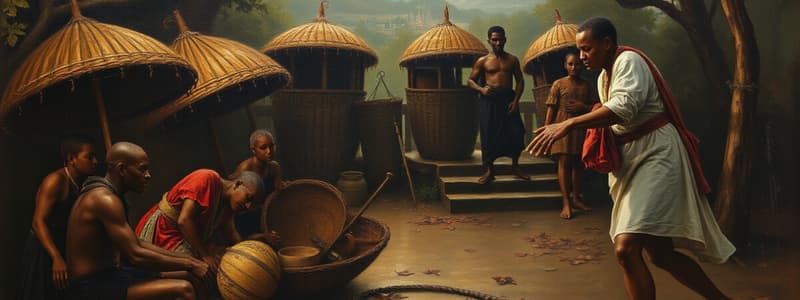Podcast
Questions and Answers
How did Europeans attempt to justify race-based slavery during the colonial period? (Select all that apply)
How did Europeans attempt to justify race-based slavery during the colonial period? (Select all that apply)
- They considered slavery a form of personal bad luck sanctioned by the heavens. (correct)
- They believed that African behaviors and customs were uncivilized and inferior to their own. (correct)
- They believed that Africans were naturally hardworking and, thus, should be used for labor.
- They believed that Africans were intrinsically good-hearted and would be easy to control.
There were more women in English America than in New Spain and New France, which led to greater equality for women in the English colonies.
There were more women in English America than in New Spain and New France, which led to greater equality for women in the English colonies.
False (B)
The majority of Europeans lived in extreme poverty over the course of the seventeenth and eighteenth centuries. As a result, many citizens were willing to risk their lives to immigrate to the colonies in search of new opportunities.
The majority of Europeans lived in extreme poverty over the course of the seventeenth and eighteenth centuries. As a result, many citizens were willing to risk their lives to immigrate to the colonies in search of new opportunities.
True (A)
Identify Deists' beliefs regarding the universe, God, and the Christian tradition. (Select all that apply)
Identify Deists' beliefs regarding the universe, God, and the Christian tradition. (Select all that apply)
What roles and tasks were typically classified as 'women's work' in English colonial life?
What roles and tasks were typically classified as 'women's work' in English colonial life?
Identify the various long-term impacts of the Great Awakening on American life. (Select all that apply)
Identify the various long-term impacts of the Great Awakening on American life. (Select all that apply)
What characteristics about women in eighteenth-century colonial America does Elizabeth Pinckney's decision to manage her family's plantation demonstrate? (Select all that apply)
What characteristics about women in eighteenth-century colonial America does Elizabeth Pinckney's decision to manage her family's plantation demonstrate? (Select all that apply)
What type of work did the vast majority of slaves perform as the colonies expanded?
What type of work did the vast majority of slaves perform as the colonies expanded?
What were the elements of the triangular trade involving New England merchants?
What were the elements of the triangular trade involving New England merchants?
Which economic sectors were commonly found in both the middle and New England colonies?
Which economic sectors were commonly found in both the middle and New England colonies?
What circumstances in Europe during the seventeenth and eighteenth centuries contributed to European settlement in the North American colonies? (Select all that apply)
What circumstances in Europe during the seventeenth and eighteenth centuries contributed to European settlement in the North American colonies? (Select all that apply)
Flashcards are hidden until you start studying
Study Notes
Race-Based Slavery Justifications
- Europeans viewed African behaviors and customs as uncivilized and inferior.
- Slavery was considered a form of personal misfortune sanctioned by divine will.
- Incorrect beliefs included viewing Africans as naturally hardworking and easy to control.
Gender in Colonies
- More women in English America compared to New Spain and New France did not lead to greater equality for women.
European Poverty and Colonization
- Majority of Europeans lived in extreme poverty during the seventeenth and eighteenth centuries.
- High poverty levels prompted many to immigrate to North American colonies for new opportunities.
Deism
- Deists believed natural laws governed the universe, not divine intervention.
- They viewed ignorance as the root of evil, highlighting reason as a virtue.
- Not a direct response to the Great Awakening but part of the Enlightenment thought.
Women's Roles in Colonial Life
- Women's work encompassed housework, fieldwork, and gardening.
- Negative classification included painting as a non-typical women's occupation.
Long-Term Impacts of the Great Awakening
- Increase in religious tolerance and a loss of ministerial control over religious practices.
- Rejection of evangelical impulses did not occur during this movement.
Elizabeth Pinckney's Leadership
- Demonstrated that women could take initiative and lead outside the home.
- Some women succeeded in traditionally male-dominated tasks, contradicting the notion of confinement to household roles.
Slave Labor in Colonies
- Majority of slave labor focused on agricultural work as colonies expanded.
Triangular Trade Elements
- New England merchants exchanged rum for slaves in Africa.
- Provisions were sent to the West Indies for sugar and molasses.
- Goods were imported from North American colonies to England for manufactured products.
Economic Characteristics of Middle Colonies
- Shared economic sectors with New England included livestock and grains such as wheat, barley, and oats.
Circumstances Leading to Settlement
- Rural European workers migrated to cities seeking opportunities.
- Farmers faced economic pressures and moved to colonies for better conditions.
- Widespread poverty pushed people to accept immigration risks due to poor living standards.
Influences on Colonies by 1750
- Arrival of new populations in the American colonies was influenced by the Enlightenment and other significant movements, transforming societal norms and thoughts.
Studying That Suits You
Use AI to generate personalized quizzes and flashcards to suit your learning preferences.




